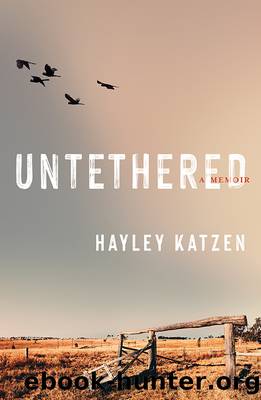Untethered by Hayley Katzen

Author:Hayley Katzen
Language: eng
Format: epub
Publisher: Ventura Press
The following week as I walked through the gates, it felt as if every single child was watching me. Should I have worn a dress? Should I change my walk? Stride more; wiggle more. What, I wondered, were these children concluding from watching me?
I was relieved when I heard someone call out, ‘Hi, Hairy Hayley!’
Saskia and Tina, two of the Aboriginal girls who often came to drama group, were sitting apart from the others.
‘We’re on bench,’ Tina explained. They’d been punished. ‘We have to eat here.’
Saskia said, ‘What’s your partner’s name again?’
‘Jen.’ So the news was all round the school.
Tina’s jaw dropped; her hands and sandwich froze mid-air.
‘Tina didn’t know about you,’ Saskia said to me, conspiratorially. ‘She wouldn’t believe me.’
Tina didn’t come to class that day.
But Katia came. She monopolised the sound system. She directed the other kids. She answered for the little ones. Her gaze silenced and withered a year-two boy.
Was this just who she, an individual, was? Or who she’d become? Perhaps because she’d witnessed violence, itself a result of racism and generations of oppression and trauma? Or was Katia seizing the upper hand in the one place she could, and in the only way she knew? Katia was perhaps acting the bully just as she was also a survivor of injustice. Duality, multidimensionality.
All I knew was that I hadn’t projected authority: I’d not disciplined Katia, and for that there was a consequence for the other kids, and for me. I could attribute my inaction to my inexperience with children. But I knew too it was because I, a white South African, still felt afraid of being labelled ‘racist’. Perhaps my insecurity and inaction had facilitated Katia’s behaviour. I don’t know.
There was only one thing I was sure of: during lunch in the back section of the year five and six classroom, twelve students, including Katia, followed my directions and made their bodies into cups and saucers, into knives and forks; they performed the roles of mothers, teachers, lost dogs. They gave themselves a round of applause at the end of the class.
And no one mentioned the L-word. Not even Katia.
We got through to the end of the year. As I walked into the school grounds for the last class carrying a large bundle under my arm, Katia asked, ‘What’s that you got?’
I said, ‘We’re playing pass the parcel in drama class.’
‘Cool,’ Katia said.
‘Yeah, but you don’t get stuff in this game – you have to do stuff,’ I said.
Thirty students crowded into the classroom that day. One or two refused to do the activities and left as the parcel bumped around the circle.
The next year I was almost relieved when the principal suggested I help with the school’s entry into a national story-sharing arts festival. This was a chance to learn how teachers handled this diverse body of kids and to perhaps have colleagues again.
On the day of the first meeting outside the classroom, the teachers were hurried and unfriendly. I wondered if this was an unwanted additional load or whether they were homophobic.
Download
This site does not store any files on its server. We only index and link to content provided by other sites. Please contact the content providers to delete copyright contents if any and email us, we'll remove relevant links or contents immediately.
| Codependency | Conflict Management |
| Dating | Divorce |
| Friendship | Interpersonal Relations |
| Love & Loss | Love & Romance |
| Marriage | Mate Seeking |
Doing It: Let's Talk About Sex... by Hannah Witton(8550)
The 5 Love Languages: The Secret to Love That Lasts by Gary Chapman(8497)
Should I Stay or Should I Go? by Ramani Durvasula(6785)
The Road Less Traveled by M. Scott Peck(6635)
The Lost Art of Listening by Michael P. Nichols(6474)
Daring Greatly by Brene Brown(5642)
We Need to Talk by Celeste Headlee(4870)
Beartown by Fredrik Backman(4419)
Men In Love by Nancy Friday(4326)
The State of Affairs by Esther Perel(3931)
The Rules Do Not Apply by Ariel Levy(3906)
How To Win Friends and Influence People by Dale Carnegie(3772)
Reflections Of A Man by Mr. Amari Soul(3703)
The Ethical Slut by Janet W. Hardy(3503)
Algedonic by r.h. Sin(3502)
Pillow Thoughts by Courtney Peppernell(3397)
Finding My Forever by Heidi McLaughlin(3307)
He's Just Not That Into You by Greg Behrendt & Liz Tuccillo(3303)
I Love You But I Don't Trust You by Mira Kirshenbaum(3229)
